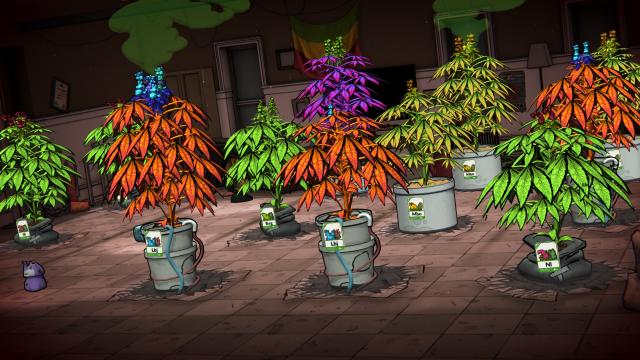Management sims and drugs are a match made in heaven. Dope Wars, which was inspired by the Star Trader BASIC game, was one of the ’90s best timewasters. But even today, where attitudes towards drugs and their legalisation has changed significantly, marketing a game about precisely that – weed – is still surprisingly hard.
Weedcraft Inc is a narrative-driven management sim about the cultivation, promotion and sale of weed. There’s also an arc about changing attitudes around weed and pushing the legislation of cannabis. The inconsistencies of the laws play a big part, as does the industry’s growing commercialisation and the impacts on smaller family-run farms.
A preview build I played featured two scenarios. The first introductory scenario features a failed MBA student who returns home after his father’s death, only to discover his younger brother had been growing weed to help relieve their father’s cancer, while making money on the side. The second features a dealer who was jailed in federal prison after smuggling weed from Colorado to California. Weed is legal in both states, but weed is criminalised federally, which is part of the quandary facing the United States in real-life.
All in all, it sounds like a good setup that a lot of management sim fans would enjoy. There’s only one major problem: despite the growing acceptance of weed, particularly among gamers worldwide, the nature of a game about a drug – one which is still illegal in many parts of the world, Australia included – makes it exceedingly difficult to promote.
“It’s really been a wake up call for how ridiculously sensitive the subject matter is still for most of the world,” Mike Wilson, the co-founder of Devolver Digital, explained over email.
For one, Devolver couldn’t get ads approved to market the game on Facebook. It doesn’t matter the wording or language, according to Wilson: Facebook simply won’t accept it.
“The guy trying repeatedly to place the ads with the most innocuous language possible got his ad account suspended,” Wilson said. “Apparently it’s the name of the game, not the language or any visuals … and this is a [business] sim game where you can play as a completely scrupulous business person in a legal industry if you so choose.”
Weedcraft Inc doesn’t highlight any actual drug use, violence, and only some mild violence, Wilson explained. Furthermore, just working on the game was problematic for some. The Devolver co-founder explained that the game has been developed from the start with the help of a “legendary tycoon game designer”, but that dev expressly asked that his name not be associated publicly with Weedcraft.
It’s not just social networks that have a problem: digital marketplaces have shied away from Weedcraft as well. “We have been turned away by some of the new platforms and services because of potential hassle of the subject matter,” Wilson said, adding that Steam would be the only platform that would ever feature the game on the front page due to its algorithm-based recommendations.
But even with the largest PC platform locked in, Devolver can’t risk targeting perhaps Steam’s largest market: China. “We can’t localise the game in Chinese or make it available even unofficially on Steam to Greater China, due to the hyper sensitivity over the subject matter there and the potential collateral damage to the Devolver brand and our other games in that region,” he explained.
It’s one instance where Steam’s more lax approach to its platform has come at a benefit to the broader community. Having played through most of the first scenario myself, Weedcraft Inc isn’t exactly Dope Wars 2.0. The game’s fairly simple mechanically. Most of the depth comes from the moral ambiguity and the choices you make: whether you opt to bribe the authorities, service special requests directly, or opt to sell cannabis as legally as possible, lobbying the right people and pushing for its legalisation as much as you can.
The game also wanted to replicate some actual brands and businesses in-game, but they had to use fake names instead because the brands didn’t want to potentially be promoting weed in states or territories where it wasn’t legal. Wilson added that an attorney specialising in the cannabis industry consulted on Weedcraft, helping the developers understand the quagmire around the legalities, which vary wildly from state to state.
And even that attorney asked for an in-game pseudonym.
“It’s all been a bit insane and quite a wake up call,” Wilson said.
This story has been updated and retimed since its original publication.

Leave a Reply